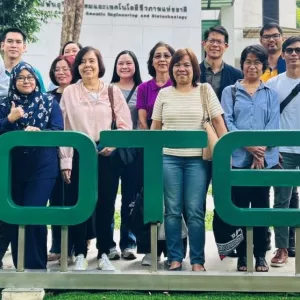Genome Editing Workshop Equips Scientists for Precision and Responsibility
Bangkok, Thailand (May 13-16, 2025) – ” How can we clearly explain genome editing, and encourage collaborations to use it effectively and create lasting impact? ” This question has been looming over conversations as a dedicated group of scientists, regulators, and communicators from across Asia gathered in Bangkok for the “Precision, Policy, and People: A Genome Editing Workshop for Crop

Genome Editing Workshop Equips Scientists for Precision and Responsibility
Bangkok, Thailand (May 13-16, 2025) – ” How can we clearly explain genome editing, and encourage collaborations to use it effectively and create lasting impact? ” This question has been looming over conversations as a dedicated group of scientists, regulators, and communicators from across Asia gathered in Bangkok for the “Precision, Policy, and People: A Genome Editing Workshop for Crop Improvement.” The four-day program aimed to equip stakeholders with the necessary tools, policy understanding, and effective communication strategies to advance genome editing in agriculture in a responsible manner.
Co-organized by the CGIAR Genome Editing Initiative, the International Rice Research Institute (IRRI), the Bureau of Rice Research Department (BRRD) of Thailand, and partner CGIAR centers, with generous support from the Gates Foundation, the U.S. Government, FCDO, and ACIAR, this workshop marked a significant step forward in fostering regional capacity and collaboration to deliver genome editing innovations that are beneficial for farmers and consumers alike.
“Science, Policy, and People” – A United Goal
In her opening remarks, Dr. Inez Slamet-Loedin, leader of the CGIAR Genome Editing Initiative, emphasized the importance of a holistic approach:
“Unlocking the potential of genome editing begins with a strong foundation in science—ensuring precision in our tools and their application. Equally essential are supportive policies and a community built on trust, transparency, and a shared purpose.”
She noted that genome editing represents not just a scientific advancement, but a collective commitment. “Our aspirations involve deepening our technical knowledge, promoting collaboration, and creating enabling environments throughout the region,” she explained. “Together, we aim to discuss not only the capabilities of genome editing but also how we can equitably and responsibly share its advantages.”
An Inclusive Program of Learning and Dialogue
The workshop centered around three…

